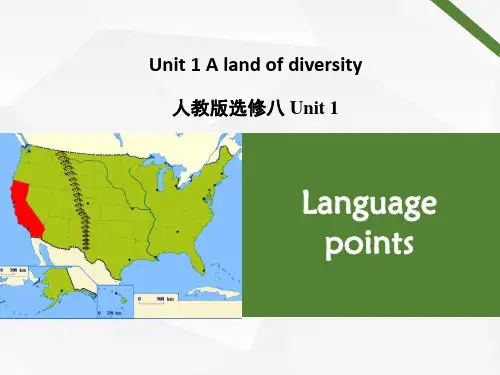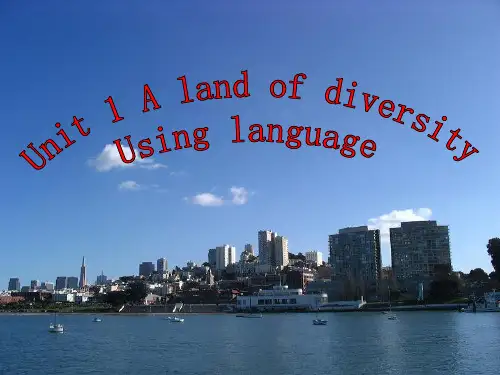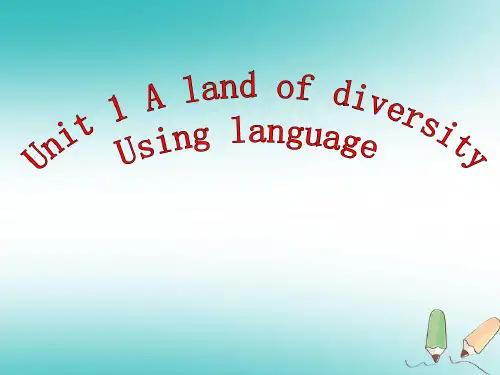高中英语人教选修八课件:Unit1LearningaboutLanguage
- 格式:docx
- 大小:53.51 KB
- 文档页数:60








教师用书配套课件Unit 1 A land of diversity一个多元化的国家Learning about Language世皿语法精讲透析一且名词性从句作主语、宾语和表语1现塞琛宠®观察下列句子,并说出黑体部分在句111的作用。
1.It is likely that Native Americans were living in California at least fifteen thousand years ago,(主语从句)2,Two centuries later, the Spanish had settled in most parts of South America and along the northwest coast of what we now call the United States.(宾语从句)3.That is why today over 40% of Californians speak Spanish as a first or second language.(表语从句)4.It is believed that before long the mix of nationalities will be so great that there will be no distinct major racial or cultural groups,(主语从句)I语法精点@一、名词性从句的定义、分类及连接词1.定义在句子屮起名诃作用的句子叫名诃性从句(Noun Clauses)。
2.分类名诃性从句的功能相当于名词(词组),它在复合句中能作主语、宾语、表语、同位语等,因此根据它在句中不同的语法功能,名词性从句又可分为主语从句、宾语从句、表语从句和同位语从句。
3.连接词;引导名词性从句的连接词可分为三类:连词:that, whether, if;连接代词:what, whatever, who, whoever. whom, whose, which,whichever 等;连接畐U 词:when, where, how. why 等。
二、主语从句1.主语从句的连接词:(1)that和whether/if:连词that在主语从句中不充当成分,但不能省略;whether引导的主语从句可位于复合句的句首,而if引导主语从句时一般不能位于句首,常用it 作形式主语。
*That he had met a kind librarian in the city library gave us no surprise.他在市图书馆里遇上一位仁慈的图书管理员并未使我们吃惊。
(that表示一种肯定、明确的概念)*Whether she will come or not is still a question.她是否会来仍是个问题。
(whether表示一种不肯定、不明确的概念)(2)连接代词(who, whose, whom, what, which,whichever,whoeverwhomever,whatever 等)0连接代词可在从句屮作主语、宾语、表语或定语。
*What role he will play in the film hasn4 been known ・在这部电影巾他将扮演什么角色还不知道。
(what S 导的从旬强调事情)*Whoever gets the job will have a lot of things to do.任何得到这份工作的人都将有很多事情要做。
(whoever引导的从句强调粽... 的人”)(3)连接副词(when, where, how, why等)。
连接副词通常在从句小作状语。
*How the prisoner escaped remains a mystery.囚犯是怎样逃脱的仍是个谜。
(从句用陈述句语序)*Why John was late for the class has been unexplained.约翰上课迟到的理山述没冇说明。
(why引导主语从句并在从句中作状语)2.主语从旬与形式主语ii:you missed the film.你错过了那部电影真是遗憾。
(that引导主语从句)*It is very important that a student (should) learn English well.学生学好英语很重要。
*It is suggested that the meeting be put off.有人建议会议延期召开。
(主语从句谓语动词用虚拟语气)* It seems that it is going to raii^ 看起来好像要下雨。
三、宾语从句1.宾语从句的连接词:宾语从句的连接词有:that, if/whether (是否),连接代词(who, whom, what, whoever, whatever, whichever 等)和连接副词(when 9 where 9 why 9 ho w 等)。
*He told me that he would go to college the next year他告诉我他明年会上大学。
(lhal可省略)* 1 can、understand why wild rocks and high mountains have become popular for a holiday・我不明白为何高山峻岭开始成为人们喜欢的假日去处。
(why引导宾语从句°从句用陈述句语序)2.动词和介词后的宾语从句:(1)大多数及物动词后都可以跟宾语从句,需要注意的是:©demand,order.suggest»advise, insist, request 等表要求、命令、建议的动词示的宾语从句的谓语常用“(should) 动词原形”;②若主句谓语是find, feel, consider,make, think 等,常用il 作形式宾语,而将宾语从句置于宾语补足语后;③有些动词接从句作宾语时要用it作形式宾语,这类动词主要有hate,like,appreciate 等。
* The commander ordered that troops (should) set off at once.司令员命令部队马上出发。
(order后接宾语从句,从句谓语动词用“should+动词原形”)*We think it important that every citizen should have good manners.我们认为每个市民有礼貌是重要的。
5为形式宾语, thal 从句为宾语从旬)*I hate it when they talk with their mouths full of food.我讨厌他们满嘴食物时说话。
(it为形式宾语)⑵介词后的宾语从句:一般情况下,介词后常接wh- 类连接词引导的宾语从句。
而except,but等少数介词后也可接引导的宾语从句。
*She always thinks of how she can do a better job.她总是在想怎样能把工作做得更好。
(how引导宾语从句)*The paper was perfect except that there were some misprints.除了一些印刷错误之外,这篇论文很好。
(that不能省略)3.宾语从句的注意事项:(1)宾语从句的时态和语序。
宾语从句一律要用陈述语序。
若主句是祈使句或主旬用现在时、将来时,从旬可根据实际需要逸用合适的时态;若主句是过去时,从句一般用过去的某种时态;若从句表达的是客观事实、真理、自然现象等,从句通背用一般现在时。
*The teacher told us that Tom had left for America.老师告诉我们汤姆去美国了。
(从句谓语动作发生在主旬谓语动作之前)*The teacher told the children that Taiwan belongs to China.老师告诉孩子们台湾属于屮国。
(从句为客观事实)(2)宾语从句的否定转移:think, believe, suppose, imagine等动词后的宾语从句中的否定词要转移到主句r|1, 即主句的谓语动词用否定式,而从句的谓语动词用肯定式。
* 1 don't think we need to waste much time on it.我想我们不必在这上面花太多时间。
(形式上否定主句,实际上还是否定从旬)◎)宾语从句中不能省略that的情况°动词后有两个或两个以上的宾语从句时,紧跟动词后的宾语从句可以省去山扎其余的宾语从句前的lhat—般不能省去。
*I believe (that) you have done your best and that things will improve.我相信你已经尽力了,一切都会好起来的。
(第二个that不能省)四、表语从句1.表语从句的连接词:引导表语从句的连接词有:连接代词(what, who, whom, whose,which 等),连接嗣词(when, where,how,why 等)以及that, whether.as if/though. because o*The problem is who we can get lo replace her.问题是我们能找到谁去替换她。
(从句用陈述句语序)*The trouble is that I have lost his address.麻烦是我把他的地址丢了。
(lhal无词义,不作成分)*It sounds as if someone is knocking at the door.听起来好像有人在敲门。
(“h sounds as if”可看作固定句式)2.使用虚拟语气的表语从句:在表示建议、劝告、命令含义的名词后的表语从句小, 谓语动词需用“should+动词原形”,should可省略。
常见的W: advice, suggestion, order, proposal 等。
* His suggestion is that we (should) make full use of our spare time.他的建议是我们应该充分利用业余时间。
(从旬用虚拟语气)3.表语从句的特殊句式:仃)This/That/It is because..."这/那是因为 ......... ”, because引导表语从句;(2)That,s why..."那就是...... 的原因”,why引导表语从句;⑶ The reason why.., is that..." .............. 的原因是.... ”, why引导的定语从句修饰先行词reason, that引导表语从*That's because he was ill.那是因为他生病了。